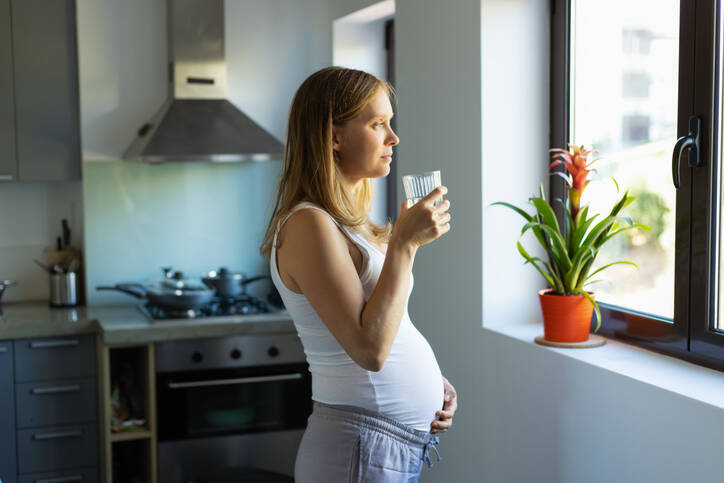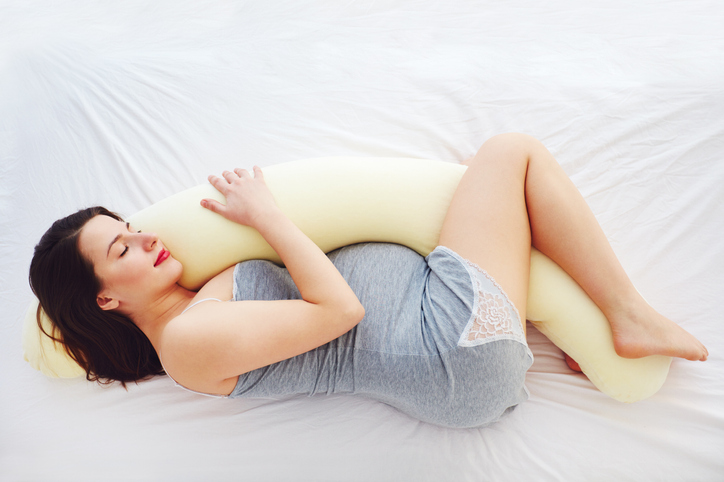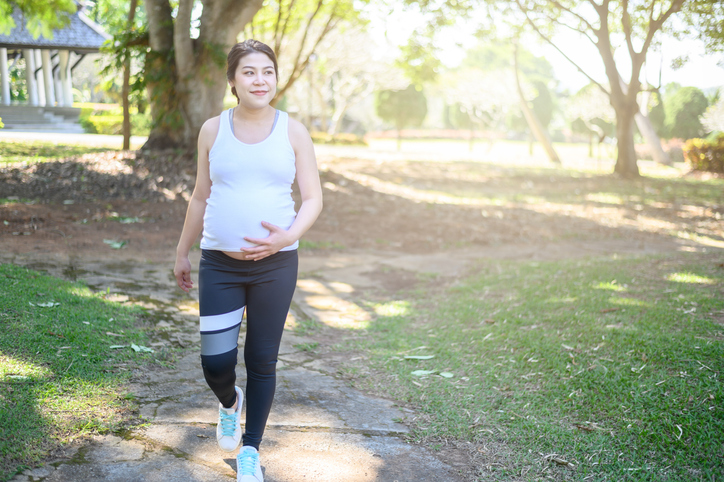- wikiskripta.eu - Skin development
- solen.sk - Mental health during pregnancy and after childbirth
- solen.sk - Muscle cramps in general practice
- pulib.sk - Options for physical activity and sport in pregnancy
- whattoexpect.com - 19th week of pregnancy
Week 19 of pregnancy: why can't I feel the movements yet?

You haven't felt your baby move yet? Don't worry. It's coming soon. You may experience leg cramps and sleep disturbances. What about sports during pregnancy?
Article content
The 19th week of pregnancy belongs to the fifth month. Baby movements appear, but it is not unusual if you do not feel them yet. It is very individual, just like gaining weight or the size of the tummy. It depends on several factors.
If you had an ultrasound, you would see your baby wiggling happily or stretching his little arms.
The moment you first feel your baby move can come any time up to week 22.
However, if you have any doubts, do not hesitate to consult your doctor.
What about the sex? Your doctor is probably just confirming whether you're carrying a girl or a boy under your heart. If that's what you want to find out. Many parents are surprised right up to the last minute.
Do you suffer from discomfort or pain in the lower abdomen?
Read the article.
How is the baby doing in the 19th week of pregnancy?
The size of the fetus is approximately 16 centimeters and 240 grams.
Your baby sleeps for up to 20 hours, so he has plenty of energy. He will soon start to let you know this. He has his own biorhythm, so he can surprise you even during the deep night.
It's a waxy, white layer of sebum that protects the skin from the continuous action of the amniotic fluid. The slippery nature of this sebum makes the birth easier. It also has an antibacterial effect.
The name vernix caseosa is of Latin origin. This protective layer is a kind of white oily substance resembling cheese. Vernix literally means varnish and caseosa means cheese.
Vernix caseosa consists of lanugo (fine hairs), oil from the glands and dead skin cells.
Its function is to protect the baby's skin from the long term effects of amniotic fluid. If the baby did not have this protective layer, his skin would be irritated, wrinkled and soggy.
As the birth approaches, it is gradually eliminated. Premature babies have even more of it. However, this does not mean any risk and is not a defect.
The table shows the approximate measurements of the fetus at 19 weeks, as measured by sonography
| Total length | CRL Distance from vertex to coccyx | Weight | HC Head circumference | BPD Transverse head diameter | AC Abdominal circumference | FL Femur length |
| 22 cm | 16 cm | 240 g | 160.3 mm | 45,2 mm | 136.7 mm | 28,5 mm |
Read more about fetal size in the article:
Ultrasound in pregnancy: fetal size, what is fetal biometry?
Mom at 19 weeks
Pregnancy is a time full of surprises and new sensations. In the 19th week of pregnancy, you may already be able to cope with nausea or leg pain. However, as pregnancy progresses, difficulties with falling asleep and staying asleep, for example, are easy to come by.
You can also read our articles on various other pregnancy problems:
Pregnancy and sleep
Have you started having trouble falling asleep or staying asleep? No wonder. Your body is changing. Positions that used to suit you may not bring you relief or relaxation now.
Of course, hormones or your state of mind and fears about expecting a baby are also contributing factors.
Try aromatherapy. Different scented candles or oils can help you relax better.
When sleeping, lying with your upper body propped up will ease the problem of heartburn.
When lying on your side, pillows placed between your knees or under your arms can be helpful.

Dreams are definitely a contributing factor to sleep problems. Some say that dreams are a harbinger of the future, others say that they are just nonsensical figments of our imagination.
But the truth remains that pregnancy dreams are some of the strangest.
Experts believe that it is a kind of result of new mental processes, unrecognized expectations and coping with the future role of a parent. The level of hormones in the future mom has a huge part in it.
It is important not to let the bad feeling of an unpleasant dream get the better of you. The stress hormone cortisol, which is released during stress, is not good for you during pregnancy.
Perhaps your dreams stem from some uncertainty or fear. Try to share your feelings with someone. Share your fears with someone and talk about them.
It's not unusual or unnatural for a mum-to-be to have some fears. First-time mothers in particular can be under a lot of pressure.
Cramps in the legs
Cramps in the thighs and calves often occur in pregnancy. During the second and third trimesters, these problems can surprise you unpleasantly, especially at night.
This is a sudden, involuntary and painful muscle contraction without an obvious cause.
During pregnancy, such cramps can be caused by pregnancy-related strain on the lower limbs, but also by mineral deficiencies.
Possible causes of leg cramps in pregnancy include:
- mineral deficiency
- vitamin deficiency
- physical fatigue and exhaustion
- dehydration
- venous insufficiency
You may also be interested in the article: leg swelling in young women or in pregnancy. What can be the causes?
You can prevent these unpleasant and painful situations by adjusting your diet. A pregnant woman's diet should contain enough minerals, vitamins, fibre and fluids.
In pregnancy, the nutritional requirements are higher. For example, magnesium should be taken about 15 to 20% more than the recommended daily allowance for an adult during pregnancy.
Read also an interesting article: what effects does magnesium have on humans, when is it needed and when is it harmful?
Regular exercise and movement is also a good prevention and solution to leg cramps. Of course, any activity must be appropriate and safe for pregnancy.
After a busy day, treat yourself to a foot massage to promote blood flow in the limbs and bring them relief.
Exercise in pregnancy
Adequate exercise and exercise are natural and beneficial in pregnancy. They also have an effect on preventing various anxiety conditions, stress or depression.
Lack of exercise, not only during pregnancy, contributes to circulatory and metabolic disorders, digestive problems, as well as muscle loss and weight gain.
What physical activities or sports are safe in pregnancy? When can movement pose a risk?
If your pregnancy is not considered risky and is going well, there is nothing to prevent you from doing sports or other physical activity. Of course, it depends on the stage of pregnancy and the type of physical activity.
In the last trimester, your growing tummy will restrict you considerably. This will affect your breathing, spinal alignment and reduced mobility.
Because of the beneficial effect of exercise on the psyche, movement is also recommended for pregnant women who did not exercise before pregnancy or are obese.
However, beware of losing weight or increasing fitness inappropriately. This can put both pregnancy and baby at risk.
It is important that movement in pregnancy is pleasant and does not cause any problems. It should be a form of relaxation and a source of pleasure.
The positive effect of adequate exercise in pregnancy:
- improves the psyche
- maintains muscle strength
- maintains a reasonable weight
- prevents various pregnancy pains, constipation, swelling of the legs
- improves sleep
- prepares the body for childbirth
- helps maintain normal blood pressure
- helps to cope better with pregnancy and the return to the original form
However, beware of overloading! Every woman has her limits and reacts differently to stress. Excessive movement and overloading can carry some risk.
Walking is one of the most suitable and popular physical activities for pregnant women. It is also suitable for women who did not do any sport before pregnancy.

Swimming is also very popular. It is suitable for women at any stage of pregnancy. The water that floats makes it easier for the mother-to-be to relax, calm her mind and unwind.
However, beware of polluted water and crowded swimming pools.
You may also be interested in this article.
Yoga has a positive effect on posture, breathing and strengthens the pelvic floor. However, it is advisable to practise under professional supervision during this type of activity.
Inappropriate sports in pregnancy include any activity that carries a risk of impact, concussion, excessive breath holding and increases intra-abdominal pressure.
These include skiing, skating, horse riding, ball games and weight training.
The hormone relaxin relaxes joints, bones and tendons during pregnancy, and not only in the pelvic area. Therefore, a pregnant woman may be more prone to various dislocations and injuries.
We mentioned more about the hormone called relaxin and the possible pain associated with it in our article on the 18th week of pregnancy.
Read more about the other weeks of pregnancy in the summary article.
Interesting resources
Related










